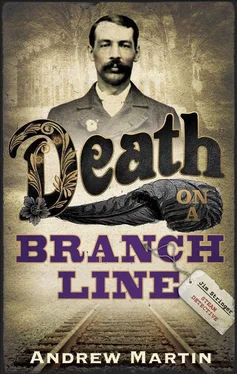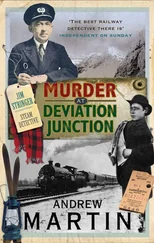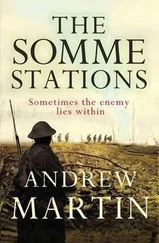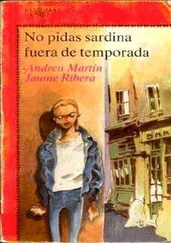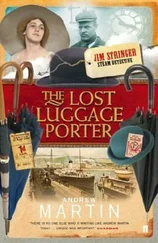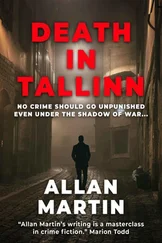Andrew Martin - Death on a Branch line
Здесь есть возможность читать онлайн «Andrew Martin - Death on a Branch line» весь текст электронной книги совершенно бесплатно (целиком полную версию без сокращений). В некоторых случаях можно слушать аудио, скачать через торрент в формате fb2 и присутствует краткое содержание. Жанр: Классический детектив, на английском языке. Описание произведения, (предисловие) а так же отзывы посетителей доступны на портале библиотеки ЛибКат.
- Название:Death on a Branch line
- Автор:
- Жанр:
- Год:неизвестен
- ISBN:нет данных
- Рейтинг книги:5 / 5. Голосов: 1
-
Избранное:Добавить в избранное
- Отзывы:
-
Ваша оценка:
- 100
- 1
- 2
- 3
- 4
- 5
Death on a Branch line: краткое содержание, описание и аннотация
Предлагаем к чтению аннотацию, описание, краткое содержание или предисловие (зависит от того, что написал сам автор книги «Death on a Branch line»). Если вы не нашли необходимую информацию о книге — напишите в комментариях, мы постараемся отыскать её.
Death on a Branch line — читать онлайн бесплатно полную книгу (весь текст) целиком
Ниже представлен текст книги, разбитый по страницам. Система сохранения места последней прочитанной страницы, позволяет с удобством читать онлайн бесплатно книгу «Death on a Branch line», без необходимости каждый раз заново искать на чём Вы остановились. Поставьте закладку, и сможете в любой момент перейти на страницу, на которой закончили чтение.
Интервал:
Закладка:
‘I’m a policeman,’ I said, as Hamer turned his wagon, and only then did I remember to fish for my warrant card, but Hamer’s ‘men’ (the donkey and the old horse) had a turn of speed in them after all, and they’d disappeared into the hedge-tunnel by the time I’d got it out.
We took the boy to his mother, who only seemed about as relieved as if some fairly insignificant missing object had been turned up. We then took tea of bread, cheese and rhubarb tart with the Handleys in the saloon bar (which was otherwise deserted) and as we ate I watched the boy. He said nothing concerning either John Lambert or Hugh Lambert, even though John was the main subject of the conversation: Mrs Handley put the boy’s disappearance down to his being upset over the forthcoming execution, and I let that go. She was right in essence, anyhow.
Mervyn was back to his old helpful ways, giving a hand to his mother as she laid out the table, but he was agitated over something, and I didn’t think it was his missing dog. Evidently it — like him — was habituated to long rambles in the woods, but could be relied on to turn up in time for its grub, which was made up of the day’s leftovers and was generally served up to it at about eight, before it settled down for its kip. I would not for the present tell Mervyn its fate. That would only put him further into his shell.
The clock in the bar said a quarter after seven when we finished the tea. Draining off the dregs of my teacup, I said, ‘I’m off back into the woods,’ and nobody appeared to find this very surprising, since that was where the hunt for John Lambert was being largely conducted.
‘I’ll sit here and keep Mrs Handley company,’ said Lydia, by which she meant that she would sit with the boy as well, in case he should speak up. I had no doubt that she’d seek the aid of his mother in persuading him to talk.
The latest downpour had stopped for the present, and a kind of airless, wet-wood smell came floating through the open windows; but I was sure we hadn’t seen the end of the rain, so I turned to Mr Handley, who had been supping John Smith’s ale while the rest of us drank tea, and asked whether he had an oilskin about the place. He made some reply that was much longer than yes or no, and at the end of it, he stood up and quit the room.
‘He has an old ulster,’ said Mrs Handley, turning towards me, and it was the first time she had translated, so to say, on behalf of her husband. She knew very well the difficulty everybody had in understanding him, and I wondered whether it made her ashamed of him. She never seemed to make conversation with her husband, and yet she was an intelligent woman. She would want to talk, and that was no doubt where Master Hugh had come in.
Mr Handley came back with the coat. It had dried leaves in the bottom of its deep pockets, and smelt of old wood fires. I wondered whether it was a left-over of his farming days. He would be much better suited to farming than running a pub; he wouldn’t have to talk as much, and there wouldn’t be John Smith’s ale always to hand. Mr Handley showed me a special pocket in the ulster, and the gist of what he said was that any object placed in there would be kept perfectly dry no matter what. As if to prove this he brought out from behind the bar a packet of Woodbines and a box of Vestas, and he stowed them in the pocket, indicating that I might smoke as many as I liked, gratis. As he leant over me I smelt the ale on his breath, which brought to mind a question.
I asked whether Hardy, the station master, had been as drunk as he’d seemed that afternoon, and Mr Handley replied (as I eventually worked out): ‘He was goin’ some, aye.’
I asked, ‘Is that out-of-the-usual for him?’ but couldn’t make out the answer.
I entered the woods once again by the path directly across from The Angel. It hardly mattered where I went in since I didn’t know what I was looking for, but only that everything bad in Adenwold started and finished in the woods. There was grey daylight over the fields but it was dusk in the woods, and I was soon lost. The air was stirless and damp; there was not a breath to breathe, and I was far too hot in the ulster. It put me in a bath of sweat.
I came after a while to a straight track bordered by evergreens, but this one didn’t lead to the Piccadilly Circus of the woods. I kept imagining that I’d struck the railway line, which would give me my bearings, but it refused to appear however much I crossed and recrossed in the ferns, nettles and brambles.
As I heard the chimes for eight o’clock, I was in a district of giant trees, where the largest of the lot had toppled over onto some of its fellows and was held up leaning, like a drunk. There then came a while sitting on a low branch, smoking one of Mr Handley’s Woodbines, thinking hard about the Reverend Ridley and listening for human sounds. But I heard only the birds ascending to and descending from the treetops, from which drops of a light rain swirled down spiral-wise.
It was getting on for nine before I gave it up, and began looking for a way out, which brought me, half-dazed, to the first village green, and the silent cottages and stores. Crossing the station yard in my clammy coat, I walked onto the ‘up’ platform.
Here I made out the figure of the station master moving in the station house behind lace curtains, and I heard the clatter of pots. Hardy was a bachelor of course, and it appeared that he had no servant, and was making his own tea. I walked along to the waiting room, where the great black horsehair bench faced the dead fireplace. A picture on the wall showed ‘The Ruins of Rievaulx Abbey’, and a horseless cart sat in the middle of these ruins, as though to pile on the misery. The walls were bare and white, and I pictured in my mind’s eye Hugh Lambert in his cell. I stepped out of the waiting room, and looked at the platform clock: 9.20. Well, very likely the condemned man had done it — and it suddenly struck me that young Mervyn might be seeking forgiveness not for himself but for Master Hugh. By going to church he might be trying to put a word in for his friend, keep him from the fires of hell.
Another possibility was that Mervyn himself had shot Sir George Lambert, and this neither I nor the wife had felt able to put into words.
I was ambling up the narrow road that led back to The Angel when I heard voices coming around the corner. It was the Chief and Captain Usher. Now this might be ticklish. We’d seen off Cooper so easily that I’d put him from my mind completely. Yet here were his governors.
The Chief wore a waterproof; Usher carried a tightly rolled umbrella. As we closed, I tried to return the Chief’s gaze without looking at his nose, which was still not right. They both looked wearied out.
I gave them good evening.
‘Not so good for Cooper,’ said Usher.
‘He chased a fellow onto the train,’ I said. ‘… Thought it was John Lambert.’
A beat of silence.
‘I don’t suppose it was,’ I ran on.
‘That’s not really any of your business, is it, Stringer?’ said Usher.
He was being cagey as usual, but there was no doubt that John Lambert was still at liberty.
‘Might I ask about friend Cooper, then?’ I said. ‘I saw him clatter his leg.’
‘Nasty bruise, that’s all,’ said the Chief. ‘I dare say you’ve been searching for Lambert yourself, in spite of instructions.’
Instructions, not orders. The Chief was on my side over this, but it was necessary for him to disguise the fact.
‘I’ve just been dangling about, really,’ I said. ‘I watched a bit of the cricket game this afternoon.’
‘And what happened there?’ said the Chief, folding his arms.
‘First side in got fifty-two — no, more like thirty-six. They weren’t up to much, anyhow. The second lot were on about three, maybe four, when the ball was lost. Then rain stopped play.’
Читать дальшеИнтервал:
Закладка:
Похожие книги на «Death on a Branch line»
Представляем Вашему вниманию похожие книги на «Death on a Branch line» списком для выбора. Мы отобрали схожую по названию и смыслу литературу в надежде предоставить читателям больше вариантов отыскать новые, интересные, ещё непрочитанные произведения.
Обсуждение, отзывы о книге «Death on a Branch line» и просто собственные мнения читателей. Оставьте ваши комментарии, напишите, что Вы думаете о произведении, его смысле или главных героях. Укажите что конкретно понравилось, а что нет, и почему Вы так считаете.
